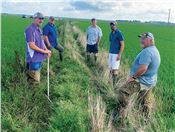LSU AgCenter Rice Verification Program Seeks New Enrollees For 2023 Growing Season

The rice verification program’s success is established through a collaborative effort among producers, extension agents and AgCenter rice specialists. Examining a 2021 verification field in Mowata in early June are, from left, Jeremy Hebert, Acadia Parish extension agent; Connor Webster, AgCenter weed science specialist; Keith and Jonathon Rockett, of R&Z Farms; and Keith Fontenot, AgCenter extension associate.
DEREK ALBERT
CROWLEY, LOUISIANA
The LSU AgCenter Rice Verification Program is in its 25th year of interpreting research data from the H. Rouse Caffey Rice Research Station and applying it to rice growing locations throughout the state.
The Rice Verification Program is an interdisciplinary effort between rice producers, parish extension agents, extension specialists and rice researchers. It is an on-farm demonstration of research-based practices and technologies recommended to maximize the production and profitability of rice in Louisiana. The overall goal is to verify that management according to LSU AgCenter recommendations can result in increased profitability compared to standard producer practices. Other goals realized from this program are to establish an economic database, to demonstrate that high yields can be constantly achieved economically and to promote timeliness in management decisions.
“We’re verifying research that’s being conducted at the Rice Research Station – and off station – to identify best management practices and recommended practices in all aspects of sustainable rice production,” said AgCenter rice specialist Ronnie Levy, who oversees the program. “The verification program gives us more environments to examine a potential problem and make adjustments in all aspects of crop production.”
Levy and AgCenter Extension Associate Keith Fontenot monitor every aspect of the rice production cycle from week to week on the designated fields in the verification program. Everything from applications of fungicide, herbicide & fertilizers to dates of flooding and rainfall rates are recorded and evaluated for sites that dot the Louisiana map. The annual process begins post-harvest with soil testing on the selected sites. The weekly monitoring continues into the variety selection stage, planting, flooding, fertilizing and harvesting. Yield data is then analyzed to determine if the best management practices recommended by researchers translated to positive results for the farmer.
In Acadia Parish, rice producer Philip Leonards has a decade of rice harvests under his belt but said the verification program is teaching him some finer points of rice production.
“[The Verification Program] helped a lot with learning about the inside of the plant,” Leonards said. “It helped me with learning the stages so that I could apply that to my other fields.”
This year, Leonards has a 50-acre field of drill-seeded CLL17 in Roberts Cove that is enrolled in the program. As Leonards awaits to see what the recently released variety will yield on that field, he is closely monitoring its progress.
“It looks pretty good,” Leonards said of the enrolled field that is currently at the heading stage. “It started off slow with the cold, but then it around and it’s looking good now.,” Leonards said word-of-mouth advertising from Acadia Parish Extension Agent Jeremy Hebert was the impetus for being enrolled in the program.
The Rice Verification Program not only offers valuable agronomic knowledge to the farmers enrolled, but also the AgCenter extension agents whose parishes host the enrollees.
“The Verification Program has been a great teaching tool – not only for farmers, but also for agents – to stay on top of the most current practices,” Hebert said. “It’s a good way for the farmer and the agent to stay in constant communication. It’s an excellent way to apply the research-based data that the specialists are finding at the Rice Research Station.”
Johnathon Rockett, of R & Z Farms in Northern Acadia Parish was enrolled in the program for the 2021 growing season. 83 acres of water- seeded CLL17 in Mowata.
“The big thing I learned was to identify different weeds and to get recommendations like what to spray on different fields…different fertilizer rates.
This year, the program has farmers enrolled in Acadia, Allen, Evangeline and St. Landry Parishes. Those locations then change for subsequent years due to crop rotation cycles. Following the initial rice harvest for each field, Levy and Fontenot make visits to the fields every other week for ratoon crop monitoring.
Levy said the AgCenter hopes to enroll more Louisiana rice producers for the 2023 crop year. Beginning in the fall, Levy and Fontenot will begin the selection process. If any rice farmers are interest ed in enrolling, they are encouraged to contact their local LSU AgCenter extension agents or Ronnie Levy at the Rice Research Station at (337) 788-7534. ∆
DEREK ALBERT: LSU AgCenter